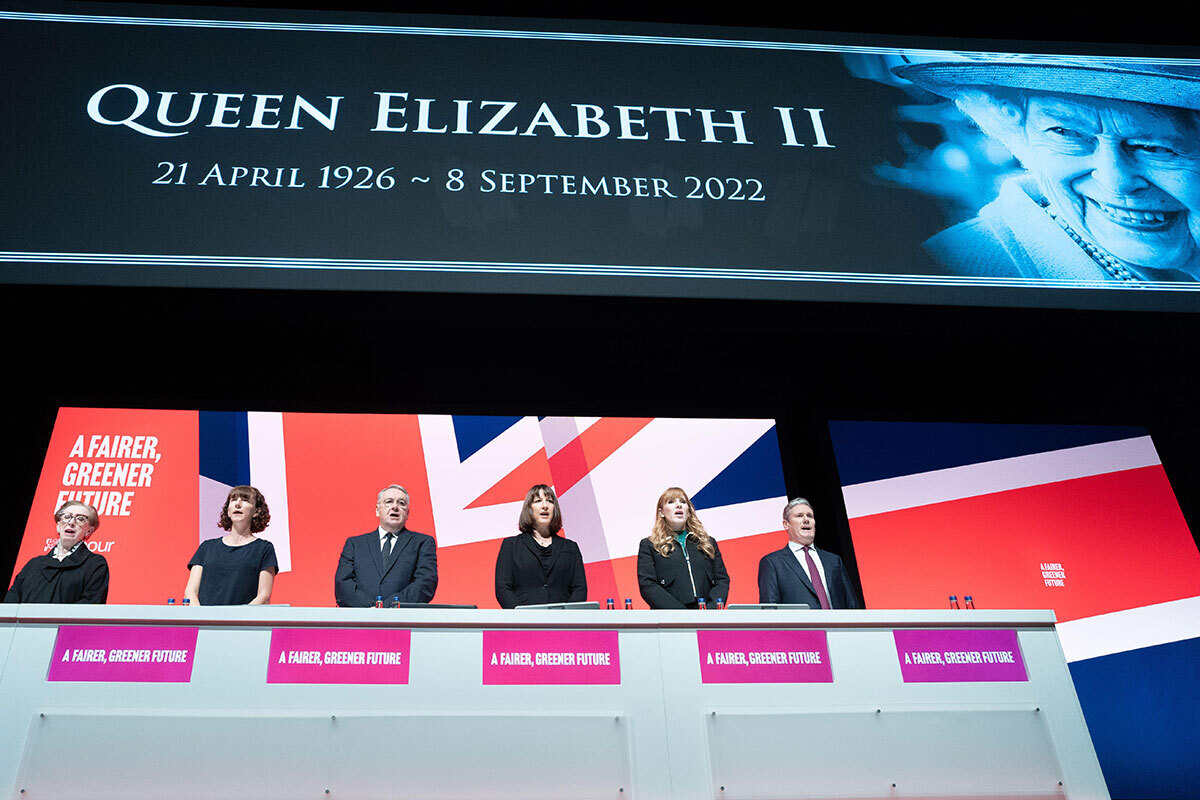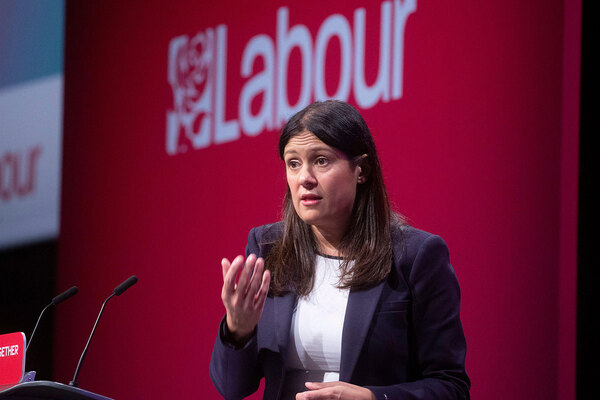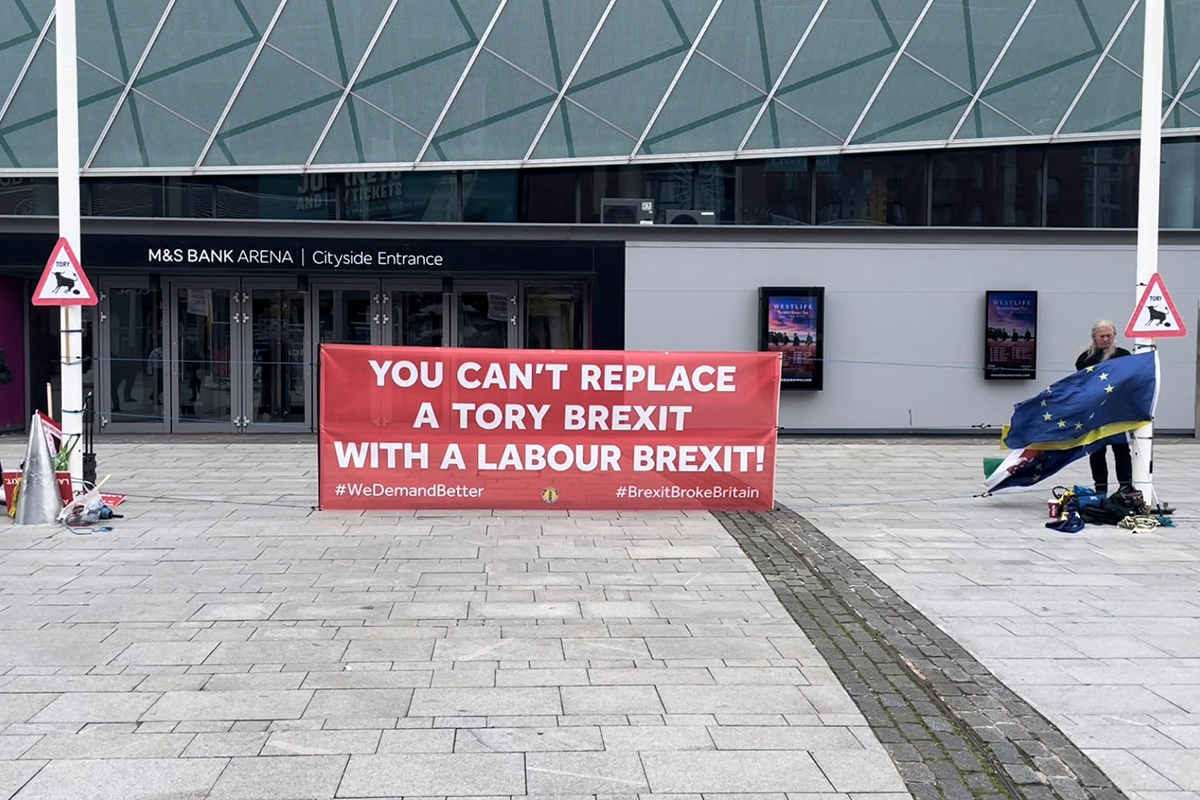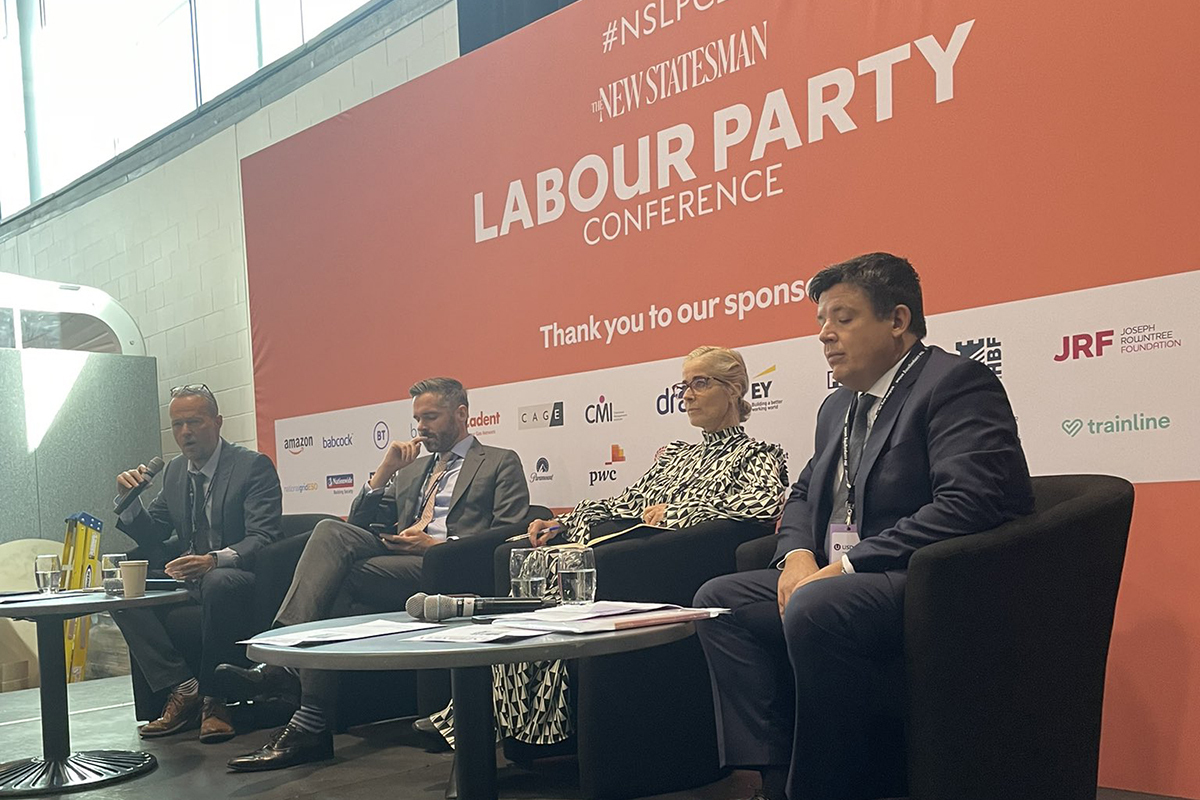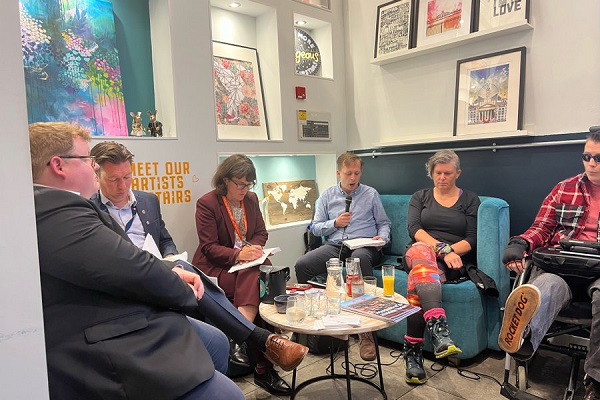You are viewing 1 of your 1 free articles
Dispatches from the Labour Party conference 2022
This week the Labour Party descended on Liverpool to host its annual conference. Stephen Delahunty and Peter Apps report on all of the housing action
In the days running up to the conference, much of the discussion focused on the decision made by Labour leader Sir Keir Starmer to pay tribute to the late Queen Elizabeth II, followed by singing the national anthem. This was a first for delegates.
One prominent ex-leader had described the decisions as “very odd”. But it went down without a hitch after what appeared to be a brief moment of trepidation before delegates broke into a chorus of God Save the King.
Although stewards were handing out the lyrics to the national anthem for those delegates who may have forgotten the words.
With that out of the way, there had been little to go on under the current leadership about what its approach to the housing crisis might look like before the conference.
Once it was revealed that shadow minister for housing and planning Matthew Pennycook was unable to attend, Inside Housing could do little more than speculate about what policies Labour may offer the sector.
But those fears would soon be laid to rest by shadow levelling-up minister Lisa Nandy on Monday, followed by a plan for increasing homeownership announced by Sir Keir in his speech on Tuesday.
Away from the drama of the main conference hall, where delegates vote for which motions they would like to see debated during the event, the conference’s fringe (discussion sessions that often feature senior speakers from the party) offered housing professionals a chance to find out how a Labour government might tackle some of the sector’s longstanding issues.
Inside Housing has rounded up the key takeaways from our time in Liverpool.
Mad World
On approach to the ACC Liverpool conference centre on Sunday, delegates were treated to a blurring rendition of Mad World by Tears for Fears courtesy of a group of anti-Brexit protesters.
The 1982 chart-topper provided a somewhat fitting starting point for a conference that began against a backdrop of a pound in freefall and a Conservative Mini Budget that sent the cost of government borrowing skyrocketing.
If Sir Keir was going to position himself as the less mad option amid this turmoil, Liverpool’s Maritime Museum offered Inside Housing the first opportunity to hear exactly what those choices could look like.
Hosted by thinktank Fabian Society and the G15, the session asked how a Labour government would build the social housing the UK needs.
To some applause, Enfield councillor Nesil Caliskan, said a Labour government should be honest and make the case to scrap the Right to Buy. Charles Trew, head of policy at Shelter, said Labour should go one step further and scrap affordable tenures in favour of a renewed focus on social rent.
As day turned into night on Sunday, several venues in Liverpool’s historic docklands hosted a number of opportunities for post-conference drinks. As the free booze flowed, rumours had begun to swirl that Labour was in fact going to announce a new building target for social rent homes, in what would be a significant intervention into the sector.
‘Never kissed a nimby’
Monday saw the unflappable anti-Brexit protesters greet delegates with a blustery interpretation of worldwide sensation Kernkraft 400 by German producer Zombie Nation.
While there was little to offer the undead in the conference program, the assisted dying stall in the exhibition centre was proving to be very popular thanks to the Swiss chocolates that were being handed out to highlight its new campaign to expand access to euthanasia.
Meanwhile, Priced Out’s stand was handing out stickers with the phrase “never kissed a nimby”. It was the affordable homes campaign group’s twist on a slogan that saw Labour frontbencher Lucy Powell accused of stirring up division after she posed in a T-shirt that read “never kissed a Tory” at a Manchester Pride event in August.
Away from the politics of dying and online dating, there was one issue that some panellists at a fringe event hosted by the New Statesman and the Home Builders Federation (HBF) agreed should be depoliticised: planning.
Neil Jefferson, managing director at the HBF, told delegates that this was important in order to help SME house builders overcome barriers to growth. He believed this would let them play a more prominent role in solving the housing crisis.
Delegates heard how the unpredictability of the planning process and complying with nutrient neutrality rules were also two of the biggest barriers that prevent SME house builders from building more homes.
Tom Copley, deputy London mayor for housing and residential development, said he resented the weaponisation of housing by some campaign groups and local parties that can make people fear new housing developments in their area.
The sector did not have to wait long, however, before Ms Nandy pledged that a Labour government would be the first in a generation to restore social housing to the second largest form of tenure. In a speech delivered on Monday afternoon, the MP for Wigan described housing as a human right as she pledged to make solving the housing crisis her “number one priority” in a well-received speech at the Labour Party conference.
Ms Nandy told delegates that the current Conservative government had turned housing into a racket that has incentivised speculation and profiteering, while millions languish on waiting lists in cold damp homes. “So we will end the deliberate vandalism of our social housing stock,” she said.
The pledge will mean that under a Labour government, the country would need to deliver more than 400,000 social homes to make up the deficit.
Labour’s plans for the sector also included a commitment to reform the private rented sector (PRS) with a new private renters’ charter, which would include ending no-fault evictions, the right to make home alterations, the right to have pets, a four-month notice period for landlords, and a national register of landlords.
The idea that housing is a human right was a theme that came up time and again in a number of fringe events. At a packed talk hosted by homelessness charity Crisis, Vauxhall MP Florence Eshalomi, co-chair of the All-Party Parliamentary Group (APPG) for Ending Homelessness, led the discussion on this issue.
Ms Eshalomi also highlighted the current inadequacies of the benefits system and the shamefully high number of deaths of people forced to sleep rough.
Monday drew to a close with Sir Keir taking part in a Q&A session with a mystery interviewer that turned out to be former Manchester United and England footballer Gary Neville. The Sky Sports presenter has become a staunch critic of the government of late and the Labour Party leader was so excited by Mr Neville’s presence that he kicked a bottle of water over.
This was followed by a quip from the former Manchester United defender: “Liz Truss has only been in for a couple of weeks and she’s tanked the pound lower than my reputation in Liverpool.”
No more buy-to-let landlords or second homeowners
The collapse of the pound and the news that banks and building societies were withdrawing mortgage deals on Tuesday left some delegates speculating just how radical an intervention into the PRS a Labour government could make.
With Sir Keir poised to announce new plans for PRS reform in his keynote address in the afternoon, Inside Housing spoke with delegates about the possibility of a rent cap and a limit on the number of homes buy-to-let landlords could own.
The Labour leader would soon put us out of our misery. He declared that he would bring homeownership up from current levels of 65% to 70% and help millions on to the housing ladder.
According to the English Housing Survey covering 2020-21, around 15.5 million households were owner-occupied. This would mean hundreds of thousands of new homeowners in the first five years of a new Labour government.
This would be achieved through new “political choices”, Sir Keir said, such as a government mortgage guarantee scheme that would mean people would not have to save up for large deposits. This would be aimed at first-time buyers rather than buy-to-let landlords.
Sir Keir said: “No more buy-to-let landlords or second homeowners getting in first. We will back working people’s aspirations.
“Help real first-time buyers onto the ladder with a new mortgage guarantee scheme.
“Reform planning so speculators can’t stop communities getting shovels in the ground.”
Amid all the adulation for Labour’s apparent new direction, there was also a chance for a moment of self-reflection for some Labour leaders.
‘We have to accept that when we were in government… we didn’t really grasp the housing issue sufficiently’
At another Shelter event on the role of local authorities in ending the housing crisis, which featured an appearance from Dan Norris, metro mayor for the West of England and former minister of the Gordon Brown government.
Mr Norris opened with an anecdote about a time he met King Charles at a housing event. Mr Norris said he was asked by the then prince what the plan was for the provision of more rural affordable housing, which was part of the minister’s brief at the time. When Mr Norris replied that the prince had the contacts to make more headway than the government, the future sovereign responded: “That’s bollocks.” Before laughing and repeating: “Bollocks, bollocks, bollocks.”
The story of the king’s surprising use of language more commonly found in a Guy Ritchie film was used to illustrate a serious point: the Labour government of the 2000s did not have a serious housing strategy and relied instead on private actors to deliver.
“We have to accept that when we were in government… we didn’t really grasp the housing issue sufficiently. We thought that the private market would provide. It was a sincere belief, but it was a false belief. It was one of the few genuinely big mistakes we made and we’ve been paying the price ever since,” said Mr Norris.
This underlines something this conference has finally made clear. Sir Keir does not appear to be pulling the party in a New Labour direction with regard to housing policy.
While the leader quoted Tony Blair in his conference speech, the policies put on the table by Ms Nandy – a full-throated commitment to a massive increase in social rent council housing and substantial new rights for private renters – bear a closer resemblance to Jeremy Corbyn’s time as leader than Mr Blair’s.
Inside Housing heard various delegates who have had private conversations with Ms Nandy say that she has been promising a major focus on council housing. The details, which are still to come, will interest all those who care about social housing, but the direction of travel will encourage those who want to see social housing go up the agenda.
Will Labour keep the Right to Buy?
Despite a number of well received plans for fixing the housing crisis, there was still one question on many delegates' lips: where does Labour stand on the Right to Buy?
Following Sir Keir’s speech, Ms Nandy was asked at a fringe event where Labour stood on the policy that the current Conservative government has pledged to extend. The shadow levelling-up minister told the audience that the policy was under review, but for her this issue was that councils were never able to keep the receipts from the sales and replace the stock.
Ms Nandy’s team are also working on a plan to “hand over powers on Right to Buy to housing associations” as it was “right for people to aspire to own their own homes”. But she reiterated earlier pledges that Labour’s plans would not lead to a reduction of the social housing stock, which had been a deliberate choice under successive Conservative governments.
With all that, it was time for karaoke. Hosted by Labour news website Labour List at The Bierkeller, the boozy affair has developed a raucous reputation. The stage was set for shadow health secretary Wes Streeting to belt out the line “I’m loving Starmer instead” to the tune of Robbie Williams’ hit Angels.
If a Labour government can deliver the promises it made at this year’s conference, it is a sentiment that many in the social housing sector may come to share.
Fire safety on the agenda
The conference also held a fringe event on building safety, which featured speakers including Georgie Hulme of the Cladding Disability Action Group, Andrew Fox-Hewitt from the Fire Brigades Union, and Peter Apps from, well, that’s me actually.
Reporting on a discussion I was a panellist in is a slightly meta-experience, but there was a major focus on encouraging Labour to up the ante in opposition to the government’s failure to implement recommendations from the Grenfell Tower Inquiry.
In particular, there was a call for the party to outline a means by which personal emergency evacuation plans (PEEPs) could be introduced. Currently the policy – which involves putting plans in place to help disabled residents escape from buildings – has been rejected by the Home Office as impracticable and too costly.
Panellists also identified the failure to mandate a second staircase in tall buildings – something which the UK is an outlier on internationally – as something the opposition party could pressure the government over more forcefully.
While fire safety did not make any major appearance on the main conference programme or in the frontbench speeches delivered to delegates, the fringe session was well attended, including by Ruth Cadbury, MP for Brentford and Isleworth, former shadow housing minister and current shadow minister for international trade.
The Labour Housing Group, an affiliated group made up of members with a particular interest in housing policy, is also evidently deeply engaged in this issue and will keep it up the agenda within the parliamentary party.
Sign up for our daily newsletter
Already have an account? Click here to manage your newsletters
